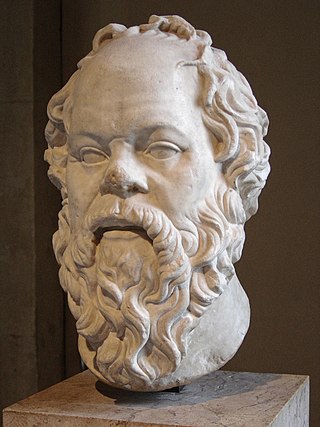Related Research Articles

In abstract algebra, a Boolean algebra or Boolean lattice is a complemented distributive lattice. This type of algebraic structure captures essential properties of both set operations and logic operations. A Boolean algebra can be seen as a generalization of a power set algebra or a field of sets, or its elements can be viewed as generalized truth values. It is also a special case of a De Morgan algebra and a Kleene algebra.

George Boole was a largely self-taught English mathematician, philosopher and logician, most of whose short career was spent as the first professor of mathematics at Queen's College, Cork in Ireland. He worked in the fields of differential equations and algebraic logic, and is best known as the author of The Laws of Thought (1854), which contains Boolean algebra. Boolean logic, essential to computer programming, is credited with helping to lay the foundations for the Information Age.

A syllogism is a kind of logical argument that applies deductive reasoning to arrive at a conclusion based on two propositions that are asserted or assumed to be true.
Classical logic or Frege–Russell logic is the intensively studied and most widely used class of deductive logic. Classical logic has had much influence on analytic philosophy.
The history of logic deals with the study of the development of the science of valid inference (logic). Formal logics developed in ancient times in India, China, and Greece. Greek methods, particularly Aristotelian logic as found in the Organon, found wide application and acceptance in Western science and mathematics for millennia. The Stoics, especially Chrysippus, began the development of predicate logic.

In the formal sciences, the domain of discourse, also called the universe of discourse, universal set, or simply universe, is the set of entities over which certain variables of interest in some formal treatment may range.
In logic and formal semantics, term logic, also known as traditional logic, syllogistic logic or Aristotelian logic, is a loose name for an approach to formal logic that began with Aristotle and was developed further in ancient history mostly by his followers, the Peripatetics. It was revived after the third century CE by Porphyry's Isagoge.

The Organon is the standard collection of Aristotle's six works on logical analysis and dialectic. The name Organon was given by Aristotle's followers, the Peripatetics, who maintained against the Stoics that Logic was "an instrument" of Philosophy.
The laws of thought are fundamental axiomatic rules upon which rational discourse itself is often considered to be based. The formulation and clarification of such rules have a long tradition in the history of philosophy and logic. Generally they are taken as laws that guide and underlie everyone's thinking, thoughts, expressions, discussions, etc. However, such classical ideas are often questioned or rejected in more recent developments, such as intuitionistic logic, dialetheism and fuzzy logic.
Boole's expansion theorem, often referred to as the Shannon expansion or decomposition, is the identity: , where is any Boolean function, is a variable, is the complement of , and and are with the argument set equal to and to respectively.

Platon Sergeevich Poretsky was a noted Russian Imperial astronomer, mathematician, and logician.
Logic is the formal science of using reason and is considered a branch of both philosophy and mathematics and to a lesser extent computer science. Logic investigates and classifies the structure of statements and arguments, both through the study of formal systems of inference and the study of arguments in natural language. The scope of logic can therefore be very large, ranging from core topics such as the study of fallacies and paradoxes, to specialized analyses of reasoning such as probability, correct reasoning, and arguments involving causality. One of the aims of logic is to identify the correct and incorrect inferences. Logicians study the criteria for the evaluation of arguments.
Boolean algebra is a mathematically rich branch of abstract algebra. Stanford Encyclopaedia of Philosophy defines Boolean algebra as 'the algebra of two-valued logic with only sentential connectives, or equivalently of algebras of sets under union and complementation.' Just as group theory deals with groups, and linear algebra with vector spaces, Boolean algebras are models of the equational theory of the two values 0 and 1. Common to Boolean algebras, groups, and vector spaces is the notion of an algebraic structure, a set closed under some operations satisfying certain equations.
In mathematical logic, algebraic logic is the reasoning obtained by manipulating equations with free variables.

John Corcoran was an American logician, philosopher, mathematician, and historian of logic. He is best known for his philosophical work on concepts such as the nature of inference, relations between conditions, argument-deduction-proof distinctions, the relationship between logic and epistemology, and the place of proof theory and model theory in logic. Nine of Corcoran's papers have been translated into Spanish, Portuguese, Persian, and Arabic; his 1989 "signature" essay was translated into three languages. Fourteen of his papers have been reprinted; one was reprinted twice.
Wholistic reference is reference to the whole—with respect to the context. In its strongest, unqualified form, the principle of wholistic reference is the proposition that each and every proposition, regardless how limited the referents of its non-logical or content terms, refers to the whole of its universe of discourse. According to this principle every proposition of number theory, even an equational proposition such as 5 + 7 = 12, refers not only to the individual numbers that it happens to mention but to the whole universe of numbers. The relation verb ‘refers’ is being used in its broad sense and not as a synonym for ‘names’ in the sense of “is a name of”.
In mathematics and mathematical logic, Boolean algebra is a branch of algebra. It differs from elementary algebra in two ways. First, the values of the variables are the truth values true and false, usually denoted 1 and 0, whereas in elementary algebra the values of the variables are numbers. Second, Boolean algebra uses logical operators such as conjunction (and) denoted as ∧, disjunction (or) denoted as ∨, and negation (not) denoted as ¬. Elementary algebra, on the other hand, uses arithmetic operators such as addition, multiplication, subtraction, and division. Boolean algebra is therefore a formal way of describing logical operations in the same way that elementary algebra describes numerical operations.
In logic, a finite-valued logic is a propositional calculus in which truth values are discrete. Traditionally, in Aristotle's logic, the bivalent logic, also known as binary logic was the norm, as the law of the excluded middle precluded more than two possible values for any proposition. Modern three-valued logic allows for an additional possible truth value.
References
Citations
- ↑ George Boole. 1854/2003. The Laws of Thought, facsimile of 1854 edition, with an introduction by J. Corcoran. Buffalo: Prometheus Books (2003). Reviewed by James van Evra in Philosophy in Review.24 (2004) 167–169.
- ↑ John Corcoran, Aristotle's Prior Analytics and Boole's Laws of Thought, History and Philosophy of Logic, 24 (2003), pp. 261–288.
- ↑ Page 42: George Boole. 1854/2003. The Laws of Thought. Facsimile of 1854 edition, with an introduction by J. Corcoran. Buffalo: Prometheus Books (2003). Reviewed by James van Evra in Philosophy in Review 24 (2004): 167–169.
Bibliography
- Burris, S. (2000). The Laws of Boole's Thought. Manuscript.
- Hailperin, T. (1976/1986). Boole's Logic and Probability. North Holland.
- Hailperin, T, (1981). Boole's algebra isn't Boolean algebra. Mathematics Magazine54(4): 172–184. Reprinted in A Boole Anthology (2000), ed. James Gasser. Synthese Library volume 291, Spring-Verlag.
- Huntington, E.V. (1904). Sets of independent postulates for the algebra of logic. Transactions of the American Mathematical Society 5:288–309.
- Jevons, W.S. (1869). The Substitution of Similars. Macmillan and Co.
- Jevons, W.S. (1990). Pure Logic and Other Minor Works. Ed. by Robert Adamson and Harriet A. Jevons. Lennox Hill Pub. & Dist. Co.
- Peirce, C.S. (1880). On the algebra of logic. In American Journal of Mathematics 3 (1880).
- Schröder, E. (1890-1905). Algebra der Logik. Three volumes, B.G. Teubner.